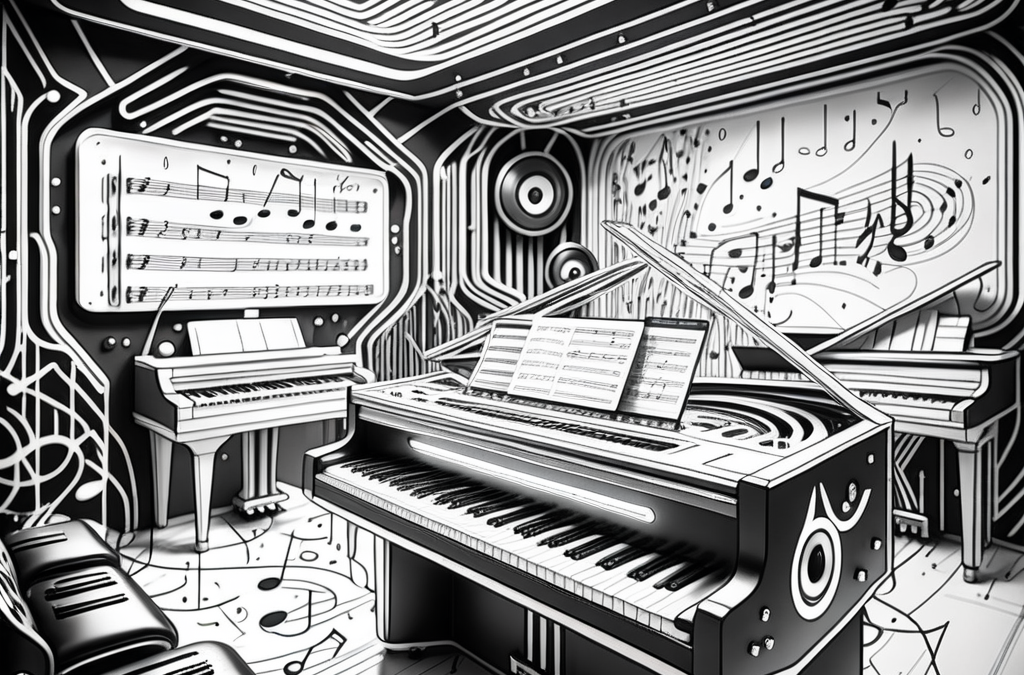I. Introduction: The Harmonious Blend of Technology and Creativity
Imagine a world where music creation knows no bounds – where algorithms can compose songs that evoke emotions, tell stories, and resonate with listeners just as human musicians do. Welcome to the future of music creation, where AI is no longer just a tool, but a partner in the creative process. In this article, we will explore the magic of AI in music creation and how it’s transforming the industry.
The music world has undergone a remarkable transformation, evolving from the primitive beats of ancient drums to the sophisticated symphonies of classical composers. Today, we’re witnessing an unprecedented convergence of technology and artistry as artificial intelligence (AI) revolutionizes the music creation process. This transformation is not a distant dream; it’s our present reality.
AI music generation is more than just a novelty; it’s a powerful tool that can augment human creativity and unlock new possibilities. By analyzing vast amounts of musical data, algorithms can recognize patterns and trends in rhythm, melody, and harmony. This capability enables AI to generate original compositions across diverse genres, whether crafting a catchy pop tune or a complex orchestral piece. The true beauty of this technology lies in its ability to collaborate with human musicians, offering new ideas and inspiration while preserving the emotional depth that music embodies.
II. Understanding AI Music Generation
The essence of AI music generation is teaching computers to understand the language of music. Algorithms and machine learning are revolutionizing the way we compose and think about music. Key aspects include:
- Pattern Recognition: AI algorithms can recognize and replicate essential elements of music, such as melody, harmony, and rhythm.
- Data Analysis: By processing thousands of existing songs across various genres, AI identifies trends, styles, and emotional resonance.
- Speed and Efficiency: AI can produce a full piece of music quickly, allowing artists to experiment more freely and creatively.
AI music generation expands the possibilities for creativity and collaboration. It can suggest chord progressions, create unique rhythms, or even generate entire backing tracks from scratch. This means anyone, regardless of their musical background or experience, can dive into music creation and contribute their ideas.
III. Exploring AI Music Composition Tools for Beginners
The world of AI music creation is more accessible than ever, and you don’t need to be a musical genius or a coding expert to get started. Here are some beginner-friendly AI music composition tools:
- Amper Music: Users can select mood, genre, and length to generate original compositions tailored to their preferences.
- Soundraw: Offers a dynamic platform for creating music with customizable elements.
- AIVA: Enables users to customize specific elements of songs, enhancing the creative experience.
Getting Started with AI Music Composition
- Choose Your Tool: Start by selecting an AI music composition tool that resonates with you. Most platforms offer free trials.
- Familiarize Yourself: Explore the features and look for tutorials or documentation to learn how to use the software effectively.
- Experiment: Generate a simple melody and play around with different instruments and arrangements to find your unique sound.
Collaborating with AI in Music Creation
As you become comfortable with AI tools, incorporate them into your songwriting process. This collaboration can lead to remarkable results, merging human emotion and creativity with AI’s computational power.
IV. The Artistry Behind Algorithms Composing Songs
At the heart of AI music composition lies machine learning, which enables computers to learn from vast amounts of data. This learning process is akin to a student absorbing knowledge from a textbook. By analyzing thousands of existing songs, AI can identify patterns and styles, ultimately generating original pieces.
Case Study: “Daddy’s Car,” created by Sony’s Flow Machines, reflects the songwriting styles of The Beatles, blending various elements to produce music that is both familiar and fresh.
AI isn’t just about producing music; it’s about collaboration. Many artists now use AI to push musical boundaries, leveraging its suggestions for chord progressions or full backing tracks.
V. The Role of AI in Music Education
AI is revolutionizing music education by providing interactive and engaging tools. Key benefits include:
- Personalized Feedback: Platforms like SmartMusic and Yousician analyze performances in real time, offering instant feedback on timing, pitch, and rhythm.
- Enhanced Teaching Methods: Educators can create customized lesson plans tailored to individual student needs.
AI’s potential to democratize music learning makes high-quality education accessible to everyone, empowering aspiring musicians to harness their creativity and talent.
VI. Current Trends and the Future of AI in Music Production
The music industry is witnessing significant trends driven by AI:
- Personalized Streaming: AI algorithms analyze listening habits to create customized playlists, enhancing music discovery on platforms like Spotify and Apple Music.
- Virtual Artists: AI-generated musicians, like Hatsune Miku, are achieving mainstream success and redefining what it means to be a musician.
Looking Ahead
As AI continues to augment the creative process, artists can expect innovative sounds and styles. However, ethical questions about ownership and compensation for human artists must be addressed as AI’s role in music production grows.
VII. Conclusion: Embracing the Sound of Tomorrow
The magic of AI in music creation is a game-changer. From composing original songs to collaborating with human artists, AI is redefining the creative process. The future of music holds endless possibilities, and it’s essential to recognize its profound impact on artists and listeners alike.
As young tech enthusiasts and future musicians, now is the perfect time to explore AI-generated music. Experiment with tools, discover new sounds, and push the boundaries of creativity. The sound of tomorrow is all around you – embrace it and make it your own. Join the revolution, and who knows? You might just create the next chart-topper with the help of AI.


